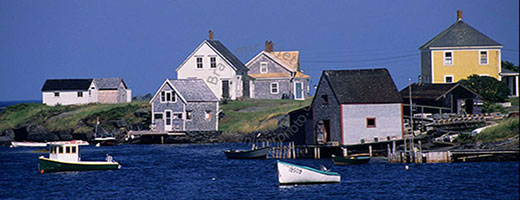The Gratitude of Atlantic Canada to EI
"In our hypothesis, we kind of assumed we'd have a negative spillover effect. But we got a positive effect and we don't know what explains this, so that's why, because of the special cultural economy in the Atlantic, it made me think about maybe it is a good idea to do some sensitivity tests."
"The question here is why the higher regional unemployment rate is associated with higher life satisfaction among workers in Atlantic Canada."
"We don't really have the answer for this, so we kind of put forward some possible explanations. One is that in Atlantic Canada you have a higher share of seasonal workers in that region, and many of them do have higher recall expectations."
Wen-Hao Chen, senior economist, Statistics Canada
"Because of the seasonal nature of the structure of the economy, people generally have been socialized into cyclical industries."
"When you lose a job it's devastating, but if you know that you're going to lose your job by the nature of the industry, it's not that you got fired, so it's not a shock to you. You know that the fishing industry ends by a certain time of the year, then you know the government steps in. So it reduces the shock itself."
"This is evidence pointing to the fact that government social programs actually lessen the negative impact of job loss."
"Public policy and social programs not only reduce the financial burden, but it also relieves your mental anguish, so your well-being ... and from that perspective you actually save on health care costs."
Ed Ng, business professor, Dalhousie University, Halifax, Nova Scotia
/https://www.thestar.com/content/dam/thestar/halifax/2018/08/01/atlantic-canadians-report-a-surprising-level-of-happiness-despite-unemployment-rate-study-shows/a_hal_unemploymentsatisfaction01.jpg) |
| The authors of a new study suggest that the prevalence of seasonal employment in the Atlantic provinces is a likely cause for the positive correlation between unemployment and satisfaction. (Andrew Vaughan / The Canadian Press) |
The high rates of unemployment in Atlantic Canada seasonally are legendary. Those receiving unemployment benefits speak of it fondly as 'the Pogy', and without embarrassment. In fact, it is well enough known -- certainly not an urban legend born of resentment in the rest of the country -- that employers and employees have established a routine of counting up work hours to qualify for unemployment funds so that others can take up the slack and be included in the qualifying work hours and resultant EI pay-outs.
A new study was undertaken looking at Canada, the United States, United Kingdom and Germany to determine the state of mind of people living congenitally with high unemployment. Invariably outside of Canada people feel unhappy and unsettled when they are unemployed and must rely on government handouts to make financial ends meet. In Canada, despite high rates of unemployment during the winter months, Atlantic Canadians alone rate their personal contentment high.
Elsewhere, the life-satisfaction gap between those who are gainfully employed and those who are in the unemployed ranks find life satisfaction steeply declining with lower well-being expressed in regions with high unemployment. Even within Canada, elsewhere than in the Atlantic provinces being unemployed and reliant on unemployment insurance leaves people heavily dissatisfied with their situation.
The positive correlation between unemployment and life satisfaction is absent for Canada as a whole, but present in Nova Scotia, New Brunswick Prince Edward Island and Newfoundland and Labrador where unemployment insurance cheques during the winter months has become a longstanding perquisite of those engaged in the fishing industry. The researchers' conclusion is that a greater number of seasonal workers in Atlantic Canada have expectations of recall.
In that they haven't faced the reality of a job loss; with the arrival of another fishing season they will be once again employed and the unemployment insurance cheques will be suspended, and all's right with their world. Knowing that this is inevitable what is considered a normal cycle of events, and one that impacts on so many others in one's community is a reassurance that all is well and normal. This transcends the dismal prospect of looking for new employment; it becomes an entitlement of expectation rewarded.
That fishing is a seasonal industry in Atlantic Canada is without dispute. The Atlantic Provinces are responsible for over 85 percent of Canada's registered fishing vessels, according to 2016 data from Fisheries and Oceans Canada. The Canadian Community Health Survey from 2009 to 2014 provided the data for the study, along with the very reality that the Atlantic Provinces were above the national average in unemployment rates for the same time frame.

Labels: Atlantic Canada, Fishing, Statistics Canada, Unemployment

<< Home